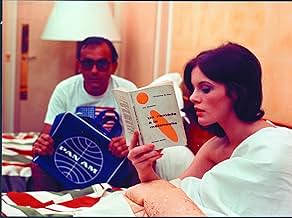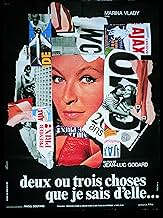2 ou 3 choses que je sais d'elle
- 1967
- Tous publics
- 1h 27min
Une journée dans la vie d'une femme au foyer et prostituée parisienne, entrecoupée de réflexions sur la guerre du Vietnam et d'autres problèmes contemporains.Une journée dans la vie d'une femme au foyer et prostituée parisienne, entrecoupée de réflexions sur la guerre du Vietnam et d'autres problèmes contemporains.Une journée dans la vie d'une femme au foyer et prostituée parisienne, entrecoupée de réflexions sur la guerre du Vietnam et d'autres problèmes contemporains.
- Réalisation
- Scénario
- Casting principal
- Récompenses
- 1 nomination au total
- Narrator
- (voix)
- Young Man
- (non crédité)
- Girl Talking to Robert
- (non crédité)
- Girl in Bath
- (non crédité)
- Christophe Jeanson
- (non crédité)
- Meter Reader
- (non crédité)
- Marianne
- (non crédité)
- Monsieur Gehrard
- (non crédité)
- Girl
- (non crédité)
- Man in Basement
- (non crédité)
- Author
- (non crédité)
- Pécuchet
- (non crédité)
- John Bogus
- (non crédité)
- Woman in Basement
- (non crédité)
- Bouvard
- (non crédité)
- Robert Jeanson
- (non crédité)
- Roger
- (non crédité)
Avis à la une
I'm not a fan of the New Wave -- Truffaut, Demy, Malle and Rohmer occasionally excepted -- but this soon reveals itself as an exercise in the failings of modern society and the people within it. Everyone is disconnected from other human beings, everyone feels hopeless and is just going through the motions and no one tries to view anything as a more than a collection of unrelated attributes. It is possible, of course, that Godard has produced a satire of current French philosophy, with everyone well-dressed in the latest fashions, smoking American cigarettes and drinking Coca-Cola, and Raoul Levy showing up as "John Bogus, the American", wearing a t-shirt with an American flag and claiming to be a photo-journalist.
I do have an urge to smack every cast member, and that is why I think it may be a satire about hyper-intellectuals who are so wise they are miserable, so assured in their beliefs that they believe nothing, so brave in their solitude that they refuse to trust anyone.
But I think not.
French's student movement turned into something of a cinema movement. To a small group of devoted young cinephiles, French film seemed like a cheap art - one capable of so much more but settled for so very little. Nobody seemed to want to experiment or toy with the medium in anyway. That is until Godard hit the scene, boasting a more assured and confident enigma and housing extremely radical and challenging themes and stylistic choices few had seen before.
I equate Godard's films to bad sex because it isn't until after watching them and reading a few thoughts by a miscellaneous bunch online do I realize if I liked them or not. His films are challenging because while watching them, you're sometimes lost in what they're trying to convey. But once you find an idea or some aesthetic attributes to latch on to, dissecting the film is a much easier process. In that respect, Godard's films may also be like an algebra test.
2 or 3 Things I Know About Her, however, is sex I never got around to fully enjoying and an algebra test I was never able to pass in the long-run. The film is nowhere near as indescribable or as impossibly vague and empty as Godard's latest work Film Socialisme, but its ability to baffle even fifty years late still holds true. This is a cinematic enigma like few others with sequences ranging from digestible and accessible to a complete mystery on my behalf.
What little coherent narrative there is focuses on Juliette Jeanson (Marina Vlady), a married bourgeois mother who begins her descent into prostitution. She drops her child off at a friend's who runs a business of watching the children of prostitutes before going about her day of shopping, cleaning the house, and meeting new clients. Godard's uniqueness in regard to the story is that he makes all of the sex lack any shred of eroticism and instead makes it rather silly (IE: a man makes a woman wear a shopping bag over her head).
Godard consistently interrupts this narrative with shots of whatever he feels like pointing the camera at with soft-spoken narration added over the images. Godard's narration often doesn't make a lot of sense, but his unpredictable comments and remarks provide the film with or feeling that he is watching this picture with us and giving his own commentary as it progresses.
During the time of 2 or 3 Things I Know About Her's release (1967 to be specific), Godard had become outspoken about his opposition towards Americanization and the ideas of the country as a whole. In the late sixties, prolific advertising began to turn up and, consequently, Godard saw this as an attack and began vocalizing his disdain for advertising. Frequently punctuating this particular picture are stray images of pop art, akin to the style Andy Warhol was famous for.
Of course, the meaning for the inclusions of these images is anyone's guess really. Godard makes his impressionistic style known and present and leaves us to form the thesis out of his work for ourselves it seems. This is one of the issues with this film as a whole. A film should never feel like it is handing you a series of clips and telling you to form an idea out of them without giving you a starting point or an anchor to latch on to. Even in the most impressionistic films by people like Ron Fricke or Gus Van Sant, there is a basic idea or concept that one can attach themselves to in order to try and form some ideas about the film's message.
Godard never seems to give us a starting point with 2 or 3 Things I Know About Her other than a compilation of clips that could very well have a deeper meaning if we knew just where the hell to begin. The pop art/advertising angle is something to go off of, but the film doesn't seem to focus on that nearly enough for it to be the main theme. And with that, even Juliette just seems like a character Godard includes to simply emphasize his appreciation and admiration for prostitutes.
As damning as 2 or 3 Things I Know About Her so often is, the film looks bright, crisp, and extremely clear thanks to the cinematography of Godard's frequent collaborator Raoul Coutard. Coutard gives the film a refined and aesthetically beautiful look, even if what he's showing us doesn't pack in a lot of clarity or real sense. As a film, 2 or 3 Things I Know About Her baffles beyond belief and fails at stringing together a coherent and digestible narrative. As an essay on film, it kinda works - if only I didn't have to cheat to figure out what could be an acceptable answer to it.
Starring: Marina Vlady. Directed by: Jean-Luc Godard.
Non-sequiturial loose-ends of non-communication between the characters, and conversations between the actors and the director which we are not allowed to follow.
Uncommunicative and unengaged philosophico-political maunderings of citizens who are floundering conceptually in a system that cannot sustain them, either morally or intellectually.
A view of Parisian building-sites as a social upheaval which yet represents the antithesis of any structural or constructivist manifestation of social progress.
A film that is, like the capitalist society that has the eye of the camera hypnotised, a profoundly blank and alienating surface, whose technique is only occasionally relieved by gratuitous scenes of meaning:
E.g. -
A woman trapped in a sink estate and yearning to be free, who is compelled by the desparation of her dream to entrap and enslave herself even further through prostitution;
The intrusion of a pimp-like meter-reader into the pure nakedness of private space;
A creche in a brothel;
A secular catechesis - The simple, non-sexual, non-manipulative dialectic of honest exploration that makes us human;
The still-birth of revolutionary thought as the spiral galaxy in a coffee-cup ...
All-in-all, the representation of a society which is profoundly inhospitable to the human beings who should constitute it, and which consequently does not permit the realisation of any aspect of humanity.
All we get are fugitive glimpses of life in the process of moral and intellectual decay. Thought and character remains unrealised, and the film is therefore also inchoate as the necessary reflection of this social unreality.
Here is a wan world, haemmoraging meaning as we watch. Here before us are the helpless ghosts of an industrial medium. They dance fitfully in the unchanging wind, the fantastic commercial simulacra in which we bind our free nature.
Strips of film, strung out like human fly-paper, where fluttering images stick only as they die. In place of creative pressure, an air of ennui, of carelessness: A drop-out film - a film of drop-outs, plot-holes in the threadbare social fabric, - neglectful of all appearances. The face of the film gazes basilisk-like out upon the viewer, resentful of our settled habits of non-involvement. Two frozen gazes cancel, the mutual incomprehension only verging on hostile irritation. No reaction. No drama. The light dies.
The hypnotic mirror of reproach whose conscience we yearn to assuage, that traps our humanity in the voyeur's dream, as it is projected back upon us in the Gorgon's gaze.
Desire is petrified - one's petty film-going expectations of this penetration of dark places disappointed. One escapes from the deathly spell of cinema into the real world.
Godard's lesson is that there is nothing meaningful in this cave of artificial shadows, and that he will bitterly wean us from our facile consumerist dreams, that we may the better engage with the harsh political realities of life.
The radically disillusioned auteur deconstructs himself. Le derniere vague flops exhausted on that endless strip where empty sprocket-holes run on aimlessly towards a dying sun.
The mechanism of dreams runs down.
We are not automata - we are made up by life. To live is the story we enact, without intermediary, and unmediated. The immediate and the authentic are alien to art. Art is a whispering empty shell left high and dry. Life is not the element of dead things: Do not listen to the shallow siren voice of le faux vague! Plunge back into humanity's proper medium.
Thus does a revolution in seeing strip out the gelatinous scales of our burned-out eyes, and there is no more interference with the wavelengths of light being broadcast from the nearest star.
Thus do the sighing bones of life articulate the bounds of existence.
We are the tides that wax and wane - the ocean that overwhelms itself, drowning its own waves in one flood of being.
Godard's film and films are under the influence of this larger movement. With his work, we are cast adrift from all anchors and familiar landmarks. We are 'all at sea'. There is a transition - a movement that is perhaps nearer to momentum than inertia - from whence we cannot recall to whither we cannot see. His is the ultimate cinema of flux.
And all of this, of course, with some of the most breathtaking cinematography I've seen in any of his work- there are close-ups that, as repetitious as they might've been, really did work. Like with the coffee- we see the coffee and the bubbles, and the colors swirling, while the narration keeps on going. There's even a very self-conscious moment where the camera blurs, the narration mentions blurred perspective, then when things come into 'focus' on both ends. In fact, this is not only one of the most self-conscious of all of Godard's work, but one of the most self-conscious films I might have ever seen. Not that this is an immediate negative, and in this framework Godard's intentions, aside from giving a good kick in the nuts to conventions and what the usual even means in typical words and descriptions of 'things' much less with cinema. There's almost a sense of consciousness expansion he's after in this self-consciousness too, which is par for the course for a Godard film. And it's also loaded to the gills with bright primary colors (this was continued into Week End, though with that in much greater, striking effect), and product placements galore; it always gives one a grin to see his great love/hate relationship with items from mass marketing and produce. And, of course, those title cards.
But what ends up lacking from the film for me, and why I would only consider it a good Godard film as opposed to a masterpiece, is that I get a lot more fulfillment watching Godard's work when he just loses all abandon of common plot-sense, and just makes almost an video essay with plenty of semantics, a loose story, and an eye for locations and people and scenery and products and all sorts of things that show him being instinctively good with the camera...BUT, that it's also entertaining. It's not that 2 or 3 Things I Know About Her isn't never quite interesting, but the fulfillment I got out of it was more of being so familiar with his work that I could get a kick out of things I could already expect in the changes of form and moments of contemplative narration, not really out of any emotional connection though to anything with anyone in the film. Juliette, unlike Karina's Nana (who, by the way, as a tongue-in-cheek in-joke appears in a pop-art style photo on a wall in one scene right from that movie), is at least 70% of the time not really a character in the usual sense: if anything she's more of a mouthpiece, a kind of figure for Godard to put forward his ideas of feminist/radical thinking, done in a manner of voice and inflection that is always the same, rarely shifting. Maybe that's part of the point, and by the end we may know more than two or three things- especially about what she's thinking and attitudes on gender and the whys and why nots of just living and existence- but emotions are almost null & void in this world.
In the meantime, as Godard maybe knows he doesn't have enough of a story with her 'real' character, when not talking to the camera, as a wife and mother, he shifts attention at times to random moments with other women, like one who talks to the camera about her banal existence ("I walk, climb, see a movie twice a month, etc"), or with a sort of touchy sexual discussion in a bar. The focus actually is never too grounded for Godard, which is partly what I mean about this film hinting at the descent his films would go to in the 80s and 90s (at least from my point of view). It's not JUST about women, it's almost about everything- drugs, culture, TV, politics, war (Vietnam especially, quite the topical philanthropic satirist he was), automobiles (a funny bit happens with a red car too), literature, morality, and all that and a bag of 60's-era Godard chips. It's worth checking out, I suppose, especially in widescreen, but not as something to see right away if getting into the director's work- I think if I had seen this as my third or fourth Godard film I might've disliked it even more. As apart of a stretch of films, I respect it and am involved, but compared to the others it's not as successful in terms of it really connecting more than it does. B+
Le saviez-vous
- AnecdotesWhen Juliette drops off her daughter at the day care/brothel, there is a painting on the wall of a screen shot of Nana Kleinfrankenheim, portrayed by Anna Karina, in Vivre sa vie: Film en douze tableaux (1962).
- Citations
Narrator: Since social relations are always ambiguous, since my thoughts divide as much as unite, and my words unite by what they express and isolate by what they omit, since a wide gulf separates my subjective certainty of myself from the objective truth others have of me, since I constantly end up guilty, even though I feel innocent, since every event changes my daily life, since I always fail to communicate, to understand, to love and be loved, and every failure deepens my solitude, since - since - since I cannot escape the objectivity crushing me nor the subjectivity expelling me, since I cannot rise to a state of being nor collapse into nothingness - I have to listen, more than ever I have to look around me at the world, my fellow creature, my brother.
- ConnexionsEdited into Notes pour Debussy - Lettre ouverte à Jean-Luc Godard (1988)
Meilleurs choix
- How long is 2 or 3 Things I Know About Her?Alimenté par Alexa
- What is the 'famous' coffee scene?
Détails
- Date de sortie
- Pays d’origine
- Langues
- Aussi connu sous le nom de
- Deux ou trois choses que je sais d'elle
- Lieux de tournage
- Sociétés de production
- Voir plus de crédits d'entreprise sur IMDbPro
Box-office
- Montant brut aux États-Unis et au Canada
- 104 038 $US
- Week-end de sortie aux États-Unis et au Canada
- 11 214 $US
- 19 nov. 2006
- Montant brut mondial
- 104 038 $US
- Durée1 heure 27 minutes
- Mixage
- Rapport de forme
- 2.35 : 1
Contribuer à cette page
















